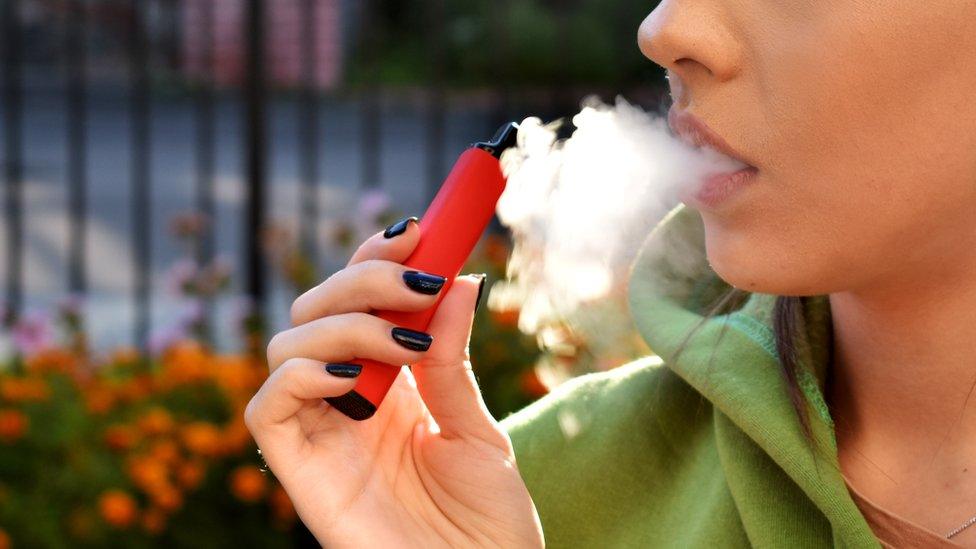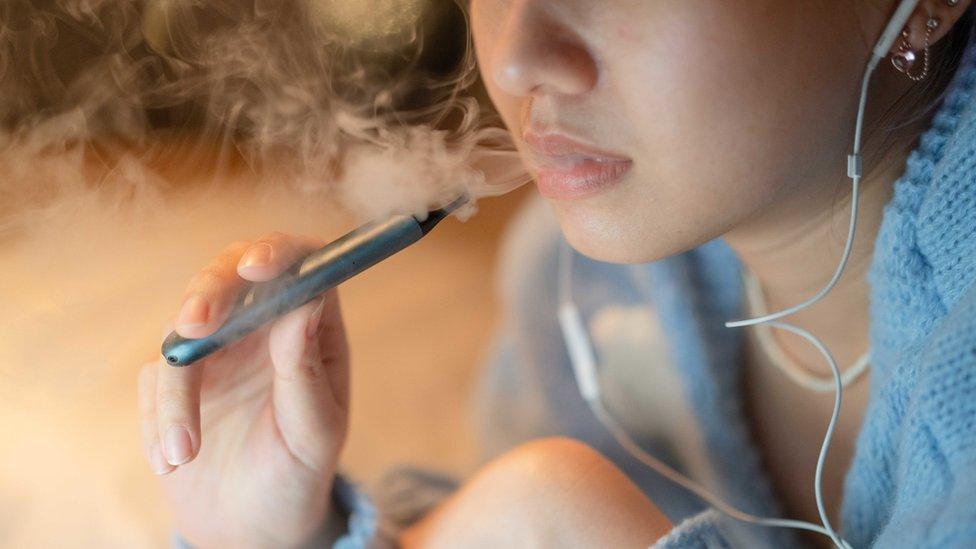Vapes: What does the new guidance mean for you?
- Published

The number of exclusions have increased in the past year as a result of vaping, reported headteachers
For the first time, guidance to help schools in Wales tackle vaping, external has been published - but what does it mean for you?
Head teachers have reported growing problems, including having to monitor toilets, increased exclusions, and disrupted lessons.
Figures from the School Health Research Network showed 20% of Year 7 to 11 students said they have tried vaping.
Public Health Wales said there are multiple solutions to these problems.
Dr Julie Bishop, director of health improvement at Public Health Wales (PHW), said education settings have experienced "significant new challenges" on vaping among young people.
It said heads have reported vaping use as a growing issue over the past two years.
Figures from the School Health Research Network, external, which surveys Welsh pupils, said 20% of Year 7s to 11s (broadly 11-16-year-olds) say they have tried vaping.
Some 5% of secondary school pupils said they vape at least once a week.

One of the methods suggested in the guidance is to teach about the environmental impact of vaping
What are the health worries?
Vapes or e-cigarettes heat a liquid that becomes a vapour people can breathe in. The liquid usually, but not always, contains nicotine.
While vaping is safer than smoking, there is "very limited" evidence about the health effects of vaping.
PHW said while switching to vapes significantly benefits smokers, there is no benefit for non-smokers, particularly children and young people.
It added that vaping puts young people at risk of nicotine addiction which can affect their education, behaviour and other aspects of their lives.
Some illegal vaping devices can contain high levels of nicotine and dangerous metals like lead, according to PHW.
What is the law on vapes?
It is illegal to sell vaping devices containing nicotine to anyone under 18 or for adults to buy them on behalf of them.
Vapes without nicotine can be sold to anyone.
What does the new guidance say?
It said vaping devices should not be used by under-18s.
PHW said there are some key actions schools can take, including understanding the patterns of vaping behaviour.
It added that schools could address any buying or selling of vapes between learners.
But it said schools should also support the young to stop, which could include discussing the cost of vaping and the reasons they do it.
For example, if students said it was to manage stress, they could be supported in finding other solutions.

The guidance said school curriculum can look at how vapes are marketed towards young people
Is vaping covered in lessons?
The guidance said information about vaping should be delivered as part of broader substance misuse education.
Smoking and vaping should not be presented as equally harmful because that is not supported by evidence, it said.
The new curriculum offers new opportunities to discuss the issue, including in relation to adolescent brain development and why teenagers make certain decisions.
The advertising, marketing and environmental impacts of vapes could also be discussed - including looking at how long it takes for the metal in the vapes to decompose.
It's not just the pupils...
PHW said use of vaping devices should be prohibited on school grounds for staff, visitors and parents too, as well as anyone who uses school facilities after hours.
It said people should also be requested not to vape directly outside school grounds.
The Welsh government said it asked PHW to draw up the guidance because of the recent rise in the use of vaping devices among young people across the UK.
"The overall aim of the guidance is to help learners understand the impact of vaping on their health and well-being, to provide evidence-based information for teachers and school staff that they can use to respond and help address vaping in their setting" it said.

A SPECIAL SCHOOL: Life in Britain’s biggest special school
FANCY A LAUGH?: Join Rhod Gilbert as he tries out different jobs across Wales

Related topics
- Published7 September 2023

- Published24 May 2023

- Published4 September 2023
